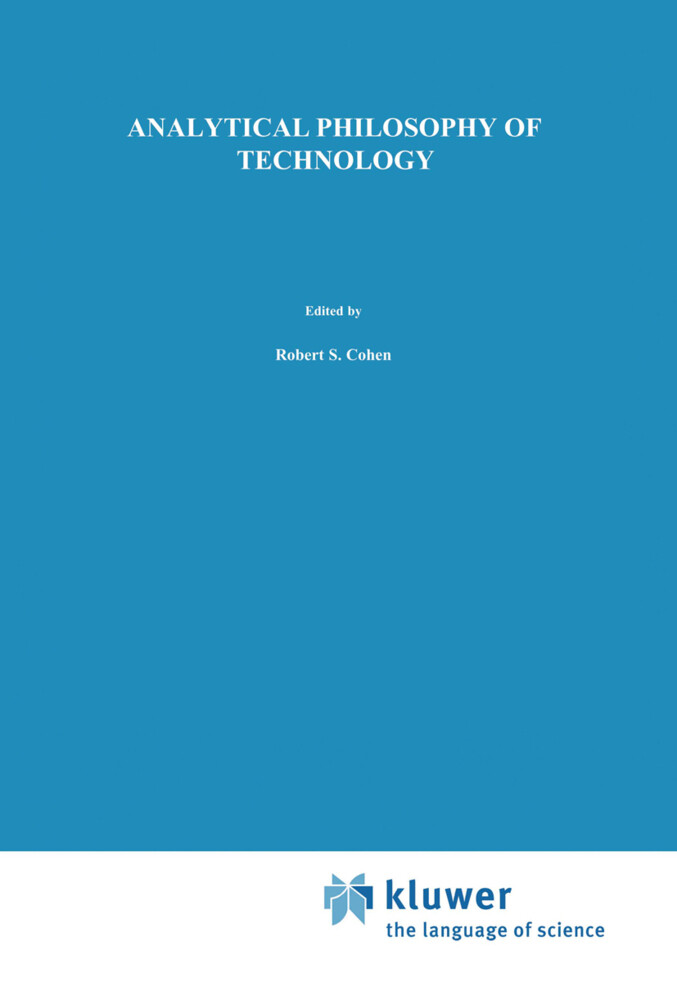
Zustellung: Mo, 30.12. - Do, 02.01.25
Versand in 2 Tagen
VersandkostenfreiBestellen & in Filiale abholen:
Friedrich Rapp, in this magisterial and critical essay on technology, the complex human phenomenon that demands philosophy of science, philosophy of culture, moral insight, and historical sensi tivity for its understanding, writes modestly of the grave and ten tative situation in the philosophy of technology. Despite the pro found thinkers who have devoted time and imagination and ratio nal penetration, despite the massive literature now available, the varied and comparative viewpoints of political, analytic, despite metaphysical, cultural, even esthetic commitments, indeed despite the honest joining of historical and systematic methods of inves tigation, we are far from a satisfactory understanding of the joys and sorrows, the achievements and disappointments, of the tech nological saga of human societies. Professor Rapp has prepared this report on the philosophical understanding of technology for a troubled world; if ever philosophy were needed, it is in the prac tical attempt to find alternatives among technologies, to foresee dangers and opportunities, to choose with a sense of the possibil ity of fulfilling humane values. Emerson spoke of the scholar not as a specialist apart, but as 'Man thinking' and Rapp's essay so speaks to all of us, industrial world or third world, engineers or humanists, tired or energetic, fearful or optimistic.
Inhaltsverzeichnis
I. Stages of the Philosophy of Technology. - 1. Introduction. - 2. The Engineering Perspective. - 3. Philosophy of Culture. - 4. Social Criticism. - 5. The Earth as a System. - 6. The Problem of Diversity of Approaches. - II. Differing Versions of the Concept of `Technology . - 1. Problems of Definition. - 2. Historical and Systematic Analysis. - 3. Periods in the History of Technology. - 4. Semantic Variations of the Concept of `Technology . - 5. Attempts at Definition. - III. Methodological Analysis. - 1. The Determinants of Technological Development. - 2. The Range of Action. - 3. The Transformation of the Material World. - 4. The Neutrality of Technological Means. - 5. Hypothetical Imperatives. - 6. Technological Progress. - IV. The Road to Modern Technology. - 1. The Socio-cultural Approach. - 2. Historical Determination. - 3. Magical and Technological Thinking. - 4. Socio-economic Conditions. - 5. Technological Foundations. - 6. The Industrial Revolution. - 7. Engineering Sciences and Natural Sciences. - 8. Intellectual Prerequisites. - 9. Complex Interconnections. - 10. Natural Instinct and Volitional Creativity. - V. The Technological World. - 1. Nature and Artifacts. - 2. The Cosmic Dimension. - 3. Accumulation and `Self-Reinforcement . - 4. The Acting Individuals. - 5. Individual Freedom and Collective Tasks. - 6. The Universality of Modern Technology. - 7. The Benefits of Technology and Their Cost. - 8. Changed Criteria. - 9. New Values. - 10. The Crisis in the Assessment of Technology. - Name Index.
Produktdetails
Erscheinungsdatum
31. Mai 1981
Sprache
englisch
Auflage
Softcover reprint of the original 1st ed. 1981
Seitenanzahl
220
Reihe
Boston Studies in the Philosophy and History of Science
Autor/Autorin
F. Rapp
Verlag/Hersteller
Produktart
kartoniert
Abbildungen
XIV, 202 p.
Gewicht
341 g
Größe (L/B/H)
235/155/13 mm
Sonstiges
Paperback
ISBN
9789027712226
Bewertungen
0 Bewertungen
Es wurden noch keine Bewertungen abgegeben. Schreiben Sie die erste Bewertung zu "Analytical Philosophy of Technology" und helfen Sie damit anderen bei der Kaufentscheidung.









